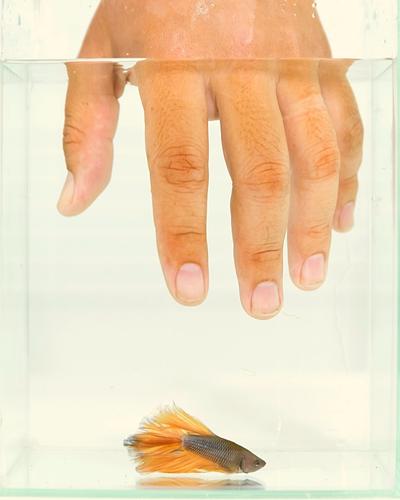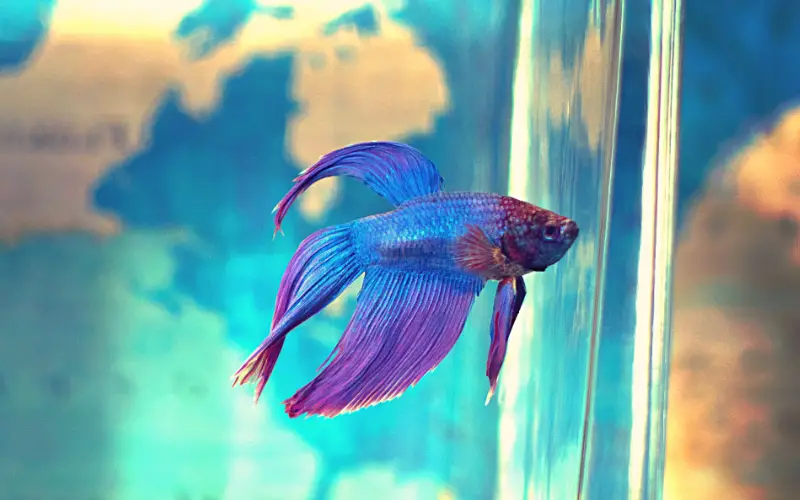Why is my betta not moving? Are you worried about your betta fish’s lack of activity? We know it can be disheartening to see your little buddy swimming around so slowly, but thankfully, there are often simple explanations for why is my betta fish not moving.
A healthy betta fish should be active and playful. If your betta is not moving, there might be a problem.
There are several reasons why your betta fish might not be moving, including stress, poor water quality, and illness.
If you’re concerned about your beta’s health, take them to a qualified local pet store veterinarian for diagnosis and treatment.

In this blog post, we’ll discuss five of the most common causes for why a betta fish might not move – from underfeeding and poor water quality to fin rot disease or calcification – and how to solve each issue.
By exploring these possibilities in depth, you’ll have the power to keep your beloved pet healthy and active for many years ahead!
Table of Contents
ToggleWhy Is My Betta Not Active?
Why my betta fish is not active? If you notice that your Betta fish is not as active as it used to be, this could indicate various potential issues. It’s crucial to perform some investigative work to figure out what might be causing the behavior change in your pet.
First and foremost, consider the environment where you keep the Bettas, like other tropical freshwater fish, thrive in temperatures between 78-80 degrees Fahrenheit and prefer clean water with appropriate pH levels (7.0-8.0).
If the water is too cold or dirty, it can negatively affect their activity level. It’s also possible that they may not have enough space to move around freely, so keeping them in an environment where they have ample room can make a big difference in their quality of life and overall energy level!
Secondly, examine whether or not your lazy betta has been getting its nutritional needs met properly; vitamins and minerals are vital components for any living creature’s well-being!
Be sure to feed your betta fish a well-balanced diet with high concentrations of proteins such as brine shrimp, insect larvae, or bloodworms—this will ensure that they get all nutrients necessary from day-to-day food intake.
Additionally, avoid overfeeding your pet fish, as this can lead to obesity and even organ damage down the line due to its digestive system overloading with too much food over long periods!
Moreover, check for signs of illness that could account for reduced movement: discoloration on its scales or body parts indicates swim bladder problems, while cloudy eyes/lackluster colored betta’s gills may signal fungal infections, ammonia poisoning, parasites present within their body systems.
Treating these underlying medical issues should help address the lethargy associated with them at once—consulting a veterinarian specializing in aquatic species is recommended since they know best how to diagnose and treat many different types of health problems among our finned friends!
What’s Wrong if Your Betta Fish Is Not Swimming?
Bettas, commonly known as Siamese fighting fish, are popular freshwater fish native to Southeast Asia. Bettas are incredibly resilient and can even survive in shallow puddles!
Despite their hardiness, there may be times when your betta isn’t usually swimming. This article will discuss five common reasons why your betta isn’t swimming and what you can do to help get it back on track.
5 Common Reasons Why Is Your Betta Not Swimming
1. Water Quality Issues
Bettas need clean water with a pH of between 6-8, so it is essential to check the water quality of your tank regularly. If the water has an unpleasant smell or cloudy appearance, this could indicate an issue such as ammonia poisoning or other contaminants.
Poor water quality can cause various health issues for betta fish, including lethargy and lack of appetite. To help prevent this from happening in the first place, make regular water changes and keep an eye on your tank’s filter system.
2. Low Oxygen Levels
Bettas need adequate oxygen levels in their tank to stay healthy and active—low oxygen levels can cause them to become sluggish and not swim as much as usual.
To ensure your betta has enough oxygen in its tank, consider adding an aerator or air stone to increase the oxygen levels in the water. Also, ensure you don’t overcrowd the tank; too many Fish can deplete the oxygen levels quickly.
3. Stress/Anxiety Issues
If your betta is not swimming despite having good water conditions and plenty of oxygen, stress or anxiety could also play a role here. One potential source of stress could be other aggressive Fish housed with your betta—if they are harassing it constantly, it may cause it to hide away instead of swimming around freely like normal.
Another possible source could be too many changes to its environment. If you just moved it into a new tank or added unique decorations recently, this could have caused some anxiety preventing it from swimming normally again. In either case, try providing a quieter environment where your betta can settle down before attempting any more drastic changes.
4. Illness/Injury Issues
It’s also possible that your betta is not swimming due to illness or injury. Suppose you notice any unusual spots on its body, cloudy eyes, or loss of appetite. In that case, these could all indicate underlying medical issues that need addressing sooner rather than later (seek veterinary advice if necessary).
In addition, watch out for signs of constipation which can lead to lethargy and lack of movement; if this is the case, try fasting them for 24 hours before introducing some carnivore pellets, which should help get things moving again!
Lastly, look out for skin parasites such as Ich which can cause severe damage if left untreated—in this instance, seek veterinary advice immediately!
5. Old Age Issues
Finally, don’t forget about old age—just like humans, our beloved pets have finite lifespans. Eventually, they will slow down due to age-related illnesses such as arthritis, heart problems, etc.
It’s essential to bear this in mind when considering why your betta isn’t swimming because the late stages of life can often bring about unexpected behavioral changes – monitor closely but don’t forget to enjoy every moment together while you still have them!
Bettas are incredibly resilient creatures, but they aren’t immune from illness or injuries from time to time, so keep an eye out for any signs of something wrong with yours!
The most common reasons your betta may not be swimming include the following:
- Poor water quality.
- Low oxygen levels.
- Stress/anxiety issues due to housing arrangements/environmental changes.
- Old age-related illnesses/injuries.
Each one requires different treatments depending on the severity, so consult expert advice if necessary! Keep up regular maintenance routines for optimal health and happiness for both you & your betta Fish! Good luck!
Is It Normal for Betta Fish to Rest at Top of Tank?
Betta not moving at top of tank: Betta fish are known for their unique ability to take in oxygen from the surface of a tank, thanks to an organ called the labyrinth.
This means that if your betta is seen near the top more often than not, it may be because there’s less dissolved oxygen at lower depths, giving them no choice but to get air however and whenever they can!
Your fish are bright– they will go into survival mode when the water tank’s temperature drops too low, conserving energy by lying still at the bottom of their tank until conditions improve to avoid temperature shock.
Why Is My Betta Fish Not Moving but Still Breathing?
Why my betta fish is not moving? but still breathing – what can I do? Stress is the most likely cause of your betta fish barely moving but breathing heavily.
Stress can affect a betta’s physical and mental health, leading to lethargy, loss of appetite, and other signs of distress.
Identifying the source of your betta’s stress and taking steps to reduce it is essential. Overcrowding, poor water quality, aggressive betta tank mates, or even an overly bright environment can affect your betta’s stress levels.
To reduce your betta’s stress levels, ensure that the water is clean and well-maintained and adjust any parameters contributing to stress (such as tank size, water temperature, or light levels).

It is also essential to keep your betta’s tank environment calm. Avoid introducing aggressive fish species into the same tank, and make sure there are plenty of hiding places for your sick betta to retreat if it needs some alone time.
If your betta’s stress levels are exceptionally high, consider giving it a break from its tank environment and placing it in a smaller betta tank.
This will allow your betta to relax and recover without potential stressors, such as too many other fish or bright lighting.
Is It Normal for a Betta Fish to Stay in One Spot?
It is common for betta fish to stay in one spot, as they are usually solitary creatures and can be pretty territorial.
Fish need still waters to thrive; too strong a current can create intense turbulence and make swimming an impossible task. No wonder they gravitate towards the quietest spots in their tank, where equilibrium reigns supreme!
Betta fish are also curious and often explore their environment, so if your betta remains in one spot for a prolonged period, it could be due to different factors.
If your betta stays in one spot, it may feel stressed or anxious due to its living environment. If this is the case, ensure you are providing your betta with an optimal habitat that adheres to its needs.
It is also possible that your betta is injured or a sick fish. If you notice any signs of illness, such as changes in color or behavior, you must consult a veterinarian as soon as possible.
Finally, if you notice your older betta fish stop swimming altogether, it could signify death. This can happen for a number o,f reasons, such as old age or a server that was left untreated.
It is essential to perform an autopsy, if possible, to determine the cause of death.
Remember, it is normal for betta fish to stay in one spot if they feel comfortable and healthy; however, if your betta remains stationary or inactive.
Why Is My Betta Fish Staying at the Top of the Tank?
If your betta fish stays at the top of the tank, it could be due to different factors.
The most common reason is that your betta is seeking oxygen-rich water. Bettas have labyrinth organs, which allow them to breathe air from the surface of the water.
It could also be a sign that your water is not clean enough. Bettas need clean, well-maintained water to stay healthy, and if the levels of ammonia or nitrates are too high, they may be more inclined to stay at the top of the tank.
Is My Betta Fish Resting or Dying Fish?
If your betta not moving at bottom of tank, it could mean they are taking a nap or simply relaxing.
However, if your betta has been resting or sleeping in the same spot for an extended period, it could be a sign that something is wrong.
If your sleeping betta fish is not moving, it could signify death. This can happen for reasons such as old age or an untreated illness.
It is also essential to check the parameters of your aquarium and ensure that it meets your betta’s needs. If the water needs to be cleaner, it could be stressing your fish out and causing them to become inactive.
Examine your betta’s mouth and gill movements to ensure they are functioning correctly. When turning the lights, it is awake; expect fast movement, while during sleep, they will slow down – this regularity should tell you that oxygen intake isn’t an issue!
Why Does My Betta Fish Not Swim Around?
Why does my betta fish stay still? Betta fish are known to be quite territorial and can often remain still in one spot for extended periods.
This could signify that your fish feels comfortable and at ease in its environment, or it may be a sign of stress or illness.
Betta fish are mysterious creatures that love to slumber! Their preferred sleeping style is unique from one betta to another, with some preferring the classic side-laying position for their restful respite.
If your hardy fish swim sideways, fish with swim bladder problems cannot maintain their buoyancy as they find themselves stuck at the bottom of the tank or drifting in impossible directions.
Although these tropical fish tend to sleep when it’s dark outside, they still manage plenty of activity during daylight hours – providing an enjoyable dynamic aquarium experience.
What Do You Do When Your Betta Fish Is Not Active?
why betta fish not active? If your betta fish is not active, the first step is to examine the environment it is living in. Ensure that all of its needs are met and that the temperature, pH levels, and water quality are optimal.
It can also help to provide your betta with plenty of places to hide and explore. This will allow the betta fish not active, to rest and remain active in its environment.
Additionally, ensure to provide your betta with a varied diet of high-quality food. A lack of nutrition can make a fish lethargic and inactive.
Commonly Asked Questions about Betta Fish Not Moving Much (FAQs)
What Do When My Betta Fish Won’t Eat and Barely Moves?
If your betta fish won’t eat and barely moves, the first step is to inspect the environment it is living in. Ensure that its water quality is optimal and that the temperature, pH, and ammonia levels are all within healthy life ranges.
Why Is My Betta Fish Not Moving at the Bottom of the Tank?
Why betta fish at bottom of tank not moving? If your betta fish stopped moving at the bottom of the tank, it could mean they are seeking oxygen-rich water. Bettas have labyrinth organs, which allow them to breathe air from the surface of the water. It could also be a sign that your water is not clean enough.
Why Is My Betta Not Eating?
If your betta is not eating, it could be a sign of stress or illness. Ensure that the water temperature and pH levels are optimal and that all your fish’s needs are met. Additionally, ensure to provide your betta with a varied diet of high-quality food.
Why Is My Betta Fish Not Moving at All?
why is my betta fish not moving much? If your male betta fish is not moving, it could signify death. This can happen for reasons such as old age or an untreated illness.
Why Is My Beta Fish Not Moving After Water Change?
Why my betta fish is not moving after changing water tank? If your betta not moving after water change, it could be due to the sudden shift in water parameters. Make sure that all the water parameters are within healthy ranges and allow your fish to adjust to the new environment before adding any decorations or plants.
Why Is My Betta Fish Lying at the Bottom of the Tank?
why won’t my betta fish move? If your betta fish laying at the bottom of the tank or on aquarium glass, it could be due to stress or a lack of oxygen. Make sure that the water quality is high, that there are plenty of places for your fish to hide and explore, and that the temperature is within optimal ranges.
What Causes Swim Bladder Disease in Bettas?
Many factors, including poor nutrition, bacterial infections, or physical trauma, can cause Betta’s swim bladder issues. Ensure that you provide your fish with a proper diet of high-quality food and that the water temperature is within healthy ranges.
How to Treat Swim Bladder Disease in Betta?
If your betta has swim bladder disease, the best action is to consult a veterinarian. Treatment may involve antibiotics, other medications, and changes to the fish’s diet or environment. Follow your vet’s instructions closely for the best chance of success.
What causes stress in a betta fish?
Stress in a betta fish is caused by poor water quality, improper tank size, sudden temperature changes, overfeeding, lack of hiding spots, aggressive tank mates, or insufficient filtration.
Why does betta fish alive but not moving?
A betta fish may be alive but not moving due to cold water temperatures, stress, illness, poor water quality, or resting. Ensure proper tank conditions to encourage normal activity.
Conclusion
So, why is my betta fish not moving? If your betta fish isn’t moving, it could be for many reasons. Their environment may not be ideal, they might be dealing with an underlying health issue, or they may simply be resting. By closely examining their tank and observing their behavior, you should be able to determine the cause of their lethargy and take steps to resolve it. So, why my betta is not moving or eating? In most cases, a little TLC is needed to get your betta fish back on track.
You might also like
- Do Betta Fish Need A Filter to Survive? (Debunking the Myth)
- A Closer Look at Betta Fish Behavior Before Death (Revealed)
- Do Betta Fish Need Air Pumps? (5 Reasons You Should Get one)
- 7 Steps on How to Save Dying Fish After Water Change (FAQ)
- How to Clean Fish Tank After Betta Dies? (Here’s What To Do!)
- Why Is My Betta Fish Turning White? (Symptoms & Curing Tips)
- What Can Betta Fish Eat of Human Food? (Bettas Diet List)
- Betta Fish Not Eating and Laying at the Tank Bottom: 3 Reasons Solved
- Betta Swimming Sideways 101: (Main Causes & Quick Fix)




